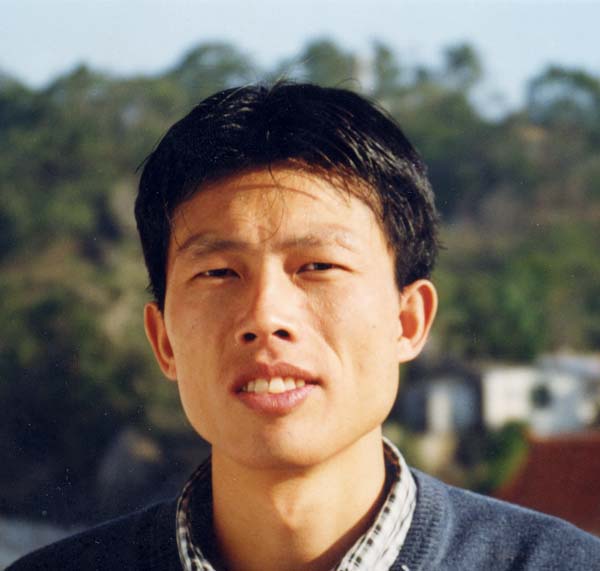 欧阳高亮OUYANG GaoliangPh.D.
欧阳高亮OUYANG GaoliangPh.D.
教授,博士生导师
干细胞与肿瘤转移课题组
Laboratory of Stem Cells and Tumor Metastasis
电话:0592-2186091
E-mail:oygldz@xmu.edu.cn
个人简历
1993, BSc., Nanchang University
2001, Ph.D., Xiamen University
1993-1996: Assistant, Jiangxi Medical College
2001-2003: Assistant Professor, Xiamen University
2006-2008: Research Scholar, Department of Molecular and Cell Biology, University of California, Berkeley, USA
2003-2010: Associate Professor, School of Life Sciences, Xiamen University
2010-Present: Professor, School of Life Sciences, Xiamen University
1993年毕业于南昌大学生物学系,获学士学位
2001年毕业于厦门大学生命科学学院,获博士学位
1993-1996 江西医学院基础医学部 助教
2001-2003 厦门大学生命科学学院 讲师
2003-2010 厦门大学生命科学学院 副教授
2006.2-2008.1 在美国加州大学伯克利分校研究学者
2010.8-至今厦门大学生命科学学院教授 博士生导师
现为厦门大学生命科学学院副院长,中国细胞生物学学会理事,中国生理学会基质生物学专业委员会委员
研究领域(Research Area)
Tumor metastasis involves dissemination of cancer cells to distant organ sites and their subsequent adaptation to and remodeling foreign tissue microenvironments. We have discovered that matricellular proteins (Periostin, OPN, etc) contribute to cell survival, EMT, stemness maintenance, angiogenesis and pre-metastatic niche formation during tumor metastasis. Our current work demonstrated that matricellular proteins play a critical role in remodeling tissue microenvironments during inflammation and tumor progression. We will continue to investigate the functions of matricellular proteins in stem cell niches and in inflammatory and metastatic microenvironments.
肿瘤转移是一复杂的多步骤过程,涉及肿瘤细胞侵袭转移至靶器官、适应并重塑靶器官的组织微环境。本课题组长期致力于研究基质-细胞蛋白(简称基质蛋白,如Periostin、OPN等)在肿瘤转移中的功能,发现这些蛋白可通过促进细胞生存、上皮细胞间质转化、干细胞干性维持、血管发生和转移前微环境形成来促进肿瘤转移。我们目前的研究表明基质蛋白在炎症发生和肿瘤转移过程中可参与重塑组织微环境。本课题组将继续深入研究基质蛋白在调控干细胞微环境、炎症微环境和肿瘤转移微环境中的功能。

代表性论著(Selected Publications)
1.Wang Z, Xiong S, Mao Y, Chen M, Ma X, Zhou X, Ma Z, Liu F, Huang Z, Luo Q,Ouyang G*. Periostin promotes immunosuppressive pre-metastatic niche formation to facilitate breast tumor metastasis. J Pathol, 2016. doi: 10.1002/path.4747. (*Corresponding author).
2.Fan C, Lin Y, Mao Y, Huang Z, Liu AY, Ma H, Yu D, Maitikabili A, Xiao H, Zhang C, Liu F, Luo
Q,Ouyang G*. MicroRNA-543 suppresses colorectal cancer growth and metastasis by targeting KRAS, MTA1 and HMGA2.Oncotarget, 2016. doi: 10.18632/oncotarget.7989.
3.Li Y, Wu S, Xiong S,Ouyang G*. Deficiency of periostin protects mice against methionine-choline-deficient diet-induced nonalcoholic steatohepatitis.J Hepatol, 62: 495-497, 2015.
4.Huang Y, Liu W, Xiao H, Maitikabili A, Lin Q, Wu T, Huang Z, Liu F, Luo Q,Ouyang G*. Matricellular
protein periostin contributes to hepatic inflammation and fibrosis.Am J Pathol, 185: 786-797, 2015.
5.Lin Y, Liu AY, Fan C, Zheng H, Li Y, Zhang C, Wu S, Yu D, Huang Z, Liu F, Luo QYang CJ,Ouyang G*. MicroRNA-33b inhibits breast cancer metastasis by targeting HMGA2, SALL4 and Twist1.Sci Rep, 5: 9995, 2015.
6.Huang Z, Wu T, Liu AY*, Ouyang G*. Differentiation and transdifferentiation potentials of cancer stem cells.Oncotarget, 6: 39550-39563, 2015.
7.Qiu H, Fang X, Luo Q*,Ouyang G*. Cancer stem cells: a potential target for cancer therapy.Cell Mol Life Sci, 72: 3411-3424, 2015.
8.Wu T, Luo Q*,Ouyang G*. Periostin: a potent chemotactic factor for recruiting tumor-associated macrophage.Protein Cell, 6: 235-237, 2015.
9.Zhou L, Liu F, Wang X*,Ouyang G*. The roles of microRNAs in the regulation of tumor metastasis.Cell Biosci, 5: 32, 2015.
10.Wu T, Wu S,Ouyang G*. Periostin: a new extracellular regulator of obesity-induced hepatosteatosis.Cell Metab, 20: 562-564, 2014. (Preview)
11.Liu AY, Zheng H,Ouyang G*. Periostin, a multifunctional matricellular protein in inflammatory and tumor microenvironments.Matrix Biol, 37: 150-156, 2014.
12.Conway SJ, Izuhara K, Kudo Y, Litvin J, Markwald R,Ouyang G, Arron JR, Holweg CT, Kudo A*. The role of periostin in tissue remodeling across health and disease.Cell Mol Life Sci, 71: 1279-1288, 2014. (All authors contributed equally).
13.Wu T,Ouyang G*. Matricellular proteins: multifaceted extracellular regulators in tumor dormancy.Protein Cell, 5: 249-252, 2014.
14.Liu AY, Cai Y, Mao Y, Lin Y, Zheng H, Wu T, Huang Y, Fang X, Lin S, Feng Q, Huang Z, Yang T, Luo Q*,Ouyang G*. Twist2 promotes self-renewal of liver cancer stem-like cells by regulating CD24.Carcinogenesis, 35: 537-545, 2014.
15.Li X, Zhang W, Liu L, Zhu Z,Ouyang G, An Y, Zhao C, Yang CJ*. In vitro selection of DNA aptamers for metastatic breast cancer cell recognition and tissue imaging.Anal Chem, 86: 6596-603, 2014.
16.Wang X, Liu J, Wang Z, Huang Y, Liu W, Zhu X, Cai Y, Fang X, Lin S, Yuan L,Ouyang G*. Periostin contributes to the acquisition of multipotent stem cell-like properties in human mammary epithelial cells and breast cancer cells.PLoS One, 8: e72962, 2013.
17.Liu AY,Ouyang G*. Tumor angiogenesis: glioblastoma stem cells as a new source of pericytes.Curr Biol, 23: R565-R568, 2013. (Dispatch)
18.Wang Z,Ouyang G*. Periostin: a bridge between cancer stem cells and their metastatic niche.Cell Stem Cell, 10: 111-112, 2012. (Preview)
19.Fang X, Cai Y, Liu J, Wang Z, Wu Q, Zhang Z, Yang CJ, Yuan L, Ouyang G*. Twist2 contributes to breast cancer progression by promoting an epithelial-mesenchymal transition and cancer stem-like cell self-renewal.Oncogene,30: 4707-4720, 2011.
20.Ruan K, Bao S,Ouyang G*. The multifaceted role of periostin in tumorigenesis.Cell Mol Life Sci, 66: 2219-2230, 2009.
21.Song G#,Ouyang G#, Mao Y, Ming Y, Bao S, Hu T. Osteopontin promotes gastric cancer metastasis by augmenting cell survival and invasion through Akt-mediated HIF-1a up-regulation and MMP9 activation.J Cell Mol Med, 13: 1706-1718, 2009. (#These authors contributed equally to this work).
22.Ouyang G*, Liu M, Ruan K, Song G, Mao Y, Bao S. Upregulated expression of periostin by hypoxia in non-small-cell lung cancer cells promotes cell survival via the Akt/PKB pathway.Cancer Lett, 281: 213-219, 2009.
23.Song G, Cai QF, Mao YB, Ming YL, Bao SD,Ouyang GL*. Osteopontin promotes ovarian cancer progression and cell survival and increases HIF-1α expression through PI3-K/Akt pathway.Cancer Sci, 99: 1901-1907, 2008.
24.Bao S,Ouyang G, Bai X, Huang Z, Ma C, Liu M, Shao R, Anderson RM, Rich JN, Wang XF*. Periostin potently promotes metastatic growth of colon cancer by augmenting cell survival via the Akt/PKB pathway.Cancer Cell, 5: 329-339, 2004.